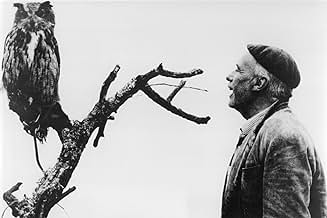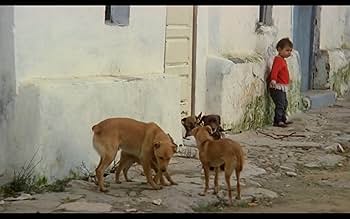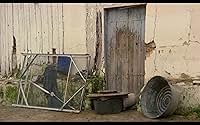NOTE IMDb
8,1/10
5,1 k
MA NOTE
Espagne, années 60. Des gens issus d'une famille très pauvre travaillent à la campagne, au service d'une riche famille de propriétaires terriens.Espagne, années 60. Des gens issus d'une famille très pauvre travaillent à la campagne, au service d'une riche famille de propriétaires terriens.Espagne, années 60. Des gens issus d'une famille très pauvre travaillent à la campagne, au service d'une riche famille de propriétaires terriens.
- Réalisation
- Scénario
- Casting principal
- Récompenses
- 6 victoires et 4 nominations au total
Pepín Salvador
- Obispo
- (as José Salvador)
Avis à la une
This intelligent drama based on a Miguel Delibes' novel and screenplay by Antonio Larreta is perfectly acted by a strong cast and masterfully directed . It depicts a brooding study about rich and poor society , making a shattering accusation against the powerful class who cares on selfish occupations more than help families in distress . Somewhere in the Extremadura region ( Spain ) , in the 60s where still rules medieval traditions , archaism and feudalism . Paco ( Alfredo Landa) and his wife Régula (Terele Pavez) along with their tree sons - one of them is backward - form a very unfortunate family . They work as tenant farmers for wealthy baron land ( Agustin Gonzalez , Agata Lys ) of a ¨Cortijo¨ . The older sons can not go to school because the ¨Señorito¨ needs their employment as servants . When Regula's brother ( Francisco Rabal) is fired by another landowner ( Jose Guardiola ) where he has worked for several years , then he settles down along with the family and the events get worse .
This over-the-top movie contains a relentless criticism to high class and the human exploitation and an attack against the rural life during the Francisco Franco time of the 60s . It's a thought-provoking drama about sacrifice, familiar love and feeling with interesting character studio of a varied assortment of individuals . It's a brilliant and touching film though sometimes is slow moving and tiring but is developed with intelligence and sensibility. In the picture are treated ethic and moral themes narrated with great sense of fairness and ductility .T his top-notch movie featuring a magnificent acting by whole casting . Awesome Alfredo Landa as the servile Paco and his wife a sensational Terele Pavez . Enticing and sensational roles with first rate performances as the cocky Señorito Ivan exceptionally acted by Juan Diego , the marchioness Mary Carrillo and her daughter played by Maribel Martin also producer along with the early deceased Julian Mateos . Of course Francisco Rabal who steals the show as Azaria always shouting : ¨ Bonita Milano¨ . Both players , Francisco Rabal and Alfredo Landa , deservedly won Ex-aequo prize the best actors in Cannes Film Festival and Prize of the Ecumenical Jury - Special Mention to filmmaker Mario Camus and the picture was Nominated Golden Palm .
Furthermore , ample shots on cloudy and nebulous skies and prairies plenty of trees filmed on location in Alburquerque, Zafra , Merida ,Badajoz, Extremadura, Spain with fine cinematography by Hans Burman . Atmospheric and evocative musical score by usual Anton Garcia Abril. This excellent motion picture is dedicated to makeup artist Julian Ruiz and stunningly directed by Mario Camus . Mario is an expert on interesting dramas as proved in ¨ The house of Bernard Alba¨ , ¨La Colmena¨ , ¨The days of the past ¨ and many others . Rating : Better than average , it's a riveting film though very depressing and downbeat . Essential and indispensable watching .
This over-the-top movie contains a relentless criticism to high class and the human exploitation and an attack against the rural life during the Francisco Franco time of the 60s . It's a thought-provoking drama about sacrifice, familiar love and feeling with interesting character studio of a varied assortment of individuals . It's a brilliant and touching film though sometimes is slow moving and tiring but is developed with intelligence and sensibility. In the picture are treated ethic and moral themes narrated with great sense of fairness and ductility .T his top-notch movie featuring a magnificent acting by whole casting . Awesome Alfredo Landa as the servile Paco and his wife a sensational Terele Pavez . Enticing and sensational roles with first rate performances as the cocky Señorito Ivan exceptionally acted by Juan Diego , the marchioness Mary Carrillo and her daughter played by Maribel Martin also producer along with the early deceased Julian Mateos . Of course Francisco Rabal who steals the show as Azaria always shouting : ¨ Bonita Milano¨ . Both players , Francisco Rabal and Alfredo Landa , deservedly won Ex-aequo prize the best actors in Cannes Film Festival and Prize of the Ecumenical Jury - Special Mention to filmmaker Mario Camus and the picture was Nominated Golden Palm .
Furthermore , ample shots on cloudy and nebulous skies and prairies plenty of trees filmed on location in Alburquerque, Zafra , Merida ,Badajoz, Extremadura, Spain with fine cinematography by Hans Burman . Atmospheric and evocative musical score by usual Anton Garcia Abril. This excellent motion picture is dedicated to makeup artist Julian Ruiz and stunningly directed by Mario Camus . Mario is an expert on interesting dramas as proved in ¨ The house of Bernard Alba¨ , ¨La Colmena¨ , ¨The days of the past ¨ and many others . Rating : Better than average , it's a riveting film though very depressing and downbeat . Essential and indispensable watching .
The last twenty five years of Spanish filmography have produced a number of titles which have indulged in sociological themes, mostly using the years of the Franco Régime as a background when not a mere scapegoat. El Sur (Victor Erice)(qv), Las Ratas (Giménez Rico)(qv), Las Bicicletas son para el Verano (Jaime Chávarri) as well as several by the now deceased Pilar Miró, come to mind. But perhaps none reach the powerful endorsement achieved in Los Santos Inocentes, carefully and predictably directed by Mario Camus. Faithfully transferred from the book by Miguel Delibes, also author of Las Ratas, as well as singularly impressive narratives such as Cinco Horas con Mario, a true tour de force in contemporary literature, and the intensely lyrical and moving El Camino, Camus inspired the principal actors - Paco Rabal, Alfredo Landa and Terele Pávez - into producing some memorable scenes.
Scenes of illiterate peasants obeying their master, landowner, insensible to everything except his passion for hunting; peasants who were so hugely grateful for the handful of pennies so compassionately handed out by the rich duchess; peasants who grovelled in the filth of their mean shack and could barely write their own names. Spain: about 1962 if the registration number of the big black Mercedes is anything to go by. Spain, in the region called Extremadura, which even today is the poorest part of the country. Spain, governed by a dictator who himself was extremely uncultured.
Camus, armed with the simple but sincere exposition in Delibes' novel, manages to show this plight, but without the tremendism so frequent in Spanish books or films; without any soured feelings, but dispassionately, like a surgeon operating for the five hundredth time on gall-stones. The story was there to be told and not sympathized over. Not for the pop-corn eating public, more for the discerning cinema-goer who can give what the film demands: attention to details. The incision is precise, exact, giving greater credibility to this little masterpiece.
Scenes of illiterate peasants obeying their master, landowner, insensible to everything except his passion for hunting; peasants who were so hugely grateful for the handful of pennies so compassionately handed out by the rich duchess; peasants who grovelled in the filth of their mean shack and could barely write their own names. Spain: about 1962 if the registration number of the big black Mercedes is anything to go by. Spain, in the region called Extremadura, which even today is the poorest part of the country. Spain, governed by a dictator who himself was extremely uncultured.
Camus, armed with the simple but sincere exposition in Delibes' novel, manages to show this plight, but without the tremendism so frequent in Spanish books or films; without any soured feelings, but dispassionately, like a surgeon operating for the five hundredth time on gall-stones. The story was there to be told and not sympathized over. Not for the pop-corn eating public, more for the discerning cinema-goer who can give what the film demands: attention to details. The incision is precise, exact, giving greater credibility to this little masterpiece.
The DVD I received from Corte Ingles includes a trailer for "Boda de Sangre" (Lorca) and this film is similar in spirit, but with even greater tension. This story is reminiscent of Cela's "Familia Duarte", and indeed the DVD includes a trailer to Cela's "Colmena" also, though I haven't seen that film.
I agree with the strong evaluations and comments of other viewers. I'll add that I enjoyed the handling of time in the film, through intermittent flashbacks and juxtapositions of modern elements - e.g., the automobiles driven by the landowners - with the nearly stone-age level of the protagonist family.
Yet for me, the level of dramatic tension became, frankly, too great to bear. I don't know how I could have handled it in a theater. Given I had mouse control, I interrupted it a few times for relief. Then, about two-thirds through, I forwarded the film to see the end. There are occasions when social realism can produce a tale of social horror harder to watch and bear than anything Hollywood's chainsaw boys ever dreamed of.
The acting and cinematography are excellent. I can imagine viewers trying to laugh at Azarias' (Francisco Rabal) rustic charm. His performance is unforgettable - especially as he, like a hand of fate (azar) delivers the much-needed catharsis near the end - but I, and I presume most, will surely view him as a charming and touching victim, fleeing reality to the extent his old age permits - until a certain cruel act drives him to action.
I would have preferred a balancing of the harshness of this film with more moments of beauty to serve as relief, as in the French Manon (e.g., Jean de Florette) films. But here, the actual social conditions were far harsher - "epoca negra" stuff at its worst - and I presume that to add such relief would have been untrue to history. For me, Familia Duarte and Boda de Sangre sufficed.
I will conclude in recommending some of Delibes' recent works. He has a wonderful sense of humor and a great versatility of style that enables him to relate even everyday events in the most charming and entertaining way. It's hard to believe that the same man who wrote Santos Inocentes also wrote "Diario de un Jubilado" and "Mis Amigas las Truchas" or "Las Perdices de Domingo". And hard to believe how far Spain and Europe have come.
I agree with the strong evaluations and comments of other viewers. I'll add that I enjoyed the handling of time in the film, through intermittent flashbacks and juxtapositions of modern elements - e.g., the automobiles driven by the landowners - with the nearly stone-age level of the protagonist family.
Yet for me, the level of dramatic tension became, frankly, too great to bear. I don't know how I could have handled it in a theater. Given I had mouse control, I interrupted it a few times for relief. Then, about two-thirds through, I forwarded the film to see the end. There are occasions when social realism can produce a tale of social horror harder to watch and bear than anything Hollywood's chainsaw boys ever dreamed of.
The acting and cinematography are excellent. I can imagine viewers trying to laugh at Azarias' (Francisco Rabal) rustic charm. His performance is unforgettable - especially as he, like a hand of fate (azar) delivers the much-needed catharsis near the end - but I, and I presume most, will surely view him as a charming and touching victim, fleeing reality to the extent his old age permits - until a certain cruel act drives him to action.
I would have preferred a balancing of the harshness of this film with more moments of beauty to serve as relief, as in the French Manon (e.g., Jean de Florette) films. But here, the actual social conditions were far harsher - "epoca negra" stuff at its worst - and I presume that to add such relief would have been untrue to history. For me, Familia Duarte and Boda de Sangre sufficed.
I will conclude in recommending some of Delibes' recent works. He has a wonderful sense of humor and a great versatility of style that enables him to relate even everyday events in the most charming and entertaining way. It's hard to believe that the same man who wrote Santos Inocentes also wrote "Diario de un Jubilado" and "Mis Amigas las Truchas" or "Las Perdices de Domingo". And hard to believe how far Spain and Europe have come.
This film will shake you to the bottom. It is truly unusual to come across a movie where deep sociological, psychological and historical issues are dealt with so soberly. This movie shows quietly all the horror and brutality of rural (feudal) life in southern Spain during the hard years of the Franco dictatorship. This film, and the novel it is based on (by M. Delibes) pays humble homage to the history of millions who were silently oppressed by the class of rural landowners that supported Franco. Now, what performances by Juan Diego, Alfredo Landa and Paco Rabal. I really recommend it to anyone interested in realist art.
This is one of the best Spanish movies I have seen. For many reasons. First, the story, which is based on a great novel by the brilliant writer Miguel Delibes, can be seen from different points of view: as the characters in themselves, or as the history of the spanish society through two generations. Second, the actors do an incredible performance (Paco Rabal and Alfredo Landa are really fantastic, not to mention Juan Diego, Mary Carrillo, Terele Pávez...). Third, the scenes' directing and editing rise to the occasion. The result is a fresh, intelligent and charming film that we won't forget for a long time. Perhaps Belén Ballesteros and Juan Sachez's performances aren't worthy of the occasion, but that's the least of my worries.
Le saviez-vous
- AnecdotesVoted eighth best Spanish film by professionals and critics in 1996 Spanish cinema centenary.
- ConnexionsFeatured in ¡Qué grande es el cine!: Los santos inocentes (1996)
Meilleurs choix
Connectez-vous pour évaluer et suivre la liste de favoris afin de recevoir des recommandations personnalisées
- How long is The Holy Innocents?Alimenté par Alexa
Détails
- Date de sortie
- Pays d’origine
- Site officiel
- Langue
- Aussi connu sous le nom de
- The Holy Innocents
- Lieux de tournage
- Sociétés de production
- Voir plus de crédits d'entreprise sur IMDbPro
- Durée1 heure 47 minutes
- Couleur
- Mixage
- Rapport de forme
- 1.66 : 1
- 1.78 : 1
Contribuer à cette page
Suggérer une modification ou ajouter du contenu manquant


![Regarder Tráiler [OV]](https://m.media-amazon.com/images/M/MV5BMDA4ZTRjZjktOTJjYi00MGRlLWE3NDktYzgzNDAyYjk4NjY5XkEyXkFqcGdeQXRyYW5zY29kZS13b3JrZmxvdw@@._V1_QL75_UX500_CR0)




























